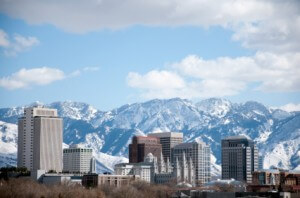ULC Court Cases: Universal Life Church v. State of Utah
October 31st, 2012
Case Background

Utah passed the Internet Statute in the 2001 legislative session and it immediately began to have a discriminating effect on Universal Life Church ministers in that state.
In 2001, the State of Utah passed legislation known as the Internet Statute that voided any ministerial certification or ordination that was obtained by an individual through the mail or internet. The legislation supported the Marriage Solemnization Statute which stated that the only individuals legally allowed to solemnize marriages were rabbis, priests or ministers of any religious denomination, aged 18 or older, who were in regular communion with their religious group or society. Native American spiritual advisers were also included in this group.
In addition to determining who was and was not allowed to legally act as wedding officiants, the State of Utah declared that attempting to solemnize a marriage without being legally able to do so could result in a prison term of up to three years.
This legislation was highly significant for Universal Life Church ministers like J.P. Pace, a ULC minister since 1993, because it effectively prevented them from performing marriage ceremonies in Utah. After becoming ordained through the Universal Life Church, J.P. Pace was provided with a certificate of ordination through the mail by the ULC Modesto and subsequently solemnized several marriages in the State of Utah before the Internet Statute came into being.
Deciding that the statute infringed upon his rights, the Universal Life Church of Modesto, CA and J.P. Pace took the State of Utah to court, arguing that the legislation violated Pace’s rights to freedom of religion,rights to equal protection of the law and the rights of due process.
Case Proceedings
The Universal Life Church legal team challenged the constitutionality of the Internet Statute. The defendant argued that the statute did not concern Pace since he did not fall under the declaration that only ministers, priests or rabbis that regularly was in regular communion within their religious organization. The defendant pointed out that Pace did not hold regular communion with any such group, meaning he was not legally allowed to solemnize marriages even when disregarding the fact that he obtained his credentials through the mail.
The Universal Life Church legal team also argued that the term “communion” was ambiguous, and that the phrase was never specifically defined by the State of Utah. They argued that the relationship between the ULC and Pace could be defined as a communion. They argued that if both the Church and Pace agreed to there being communion between them, then legally they should be supported by the Marriage Solemnization Statute.
Rulings and Outcomes
Universal Life Church v. State of Utah was not a class action suit but the court recognized that the outcome would affect the more than 5,600 individuals ordained by the ULC residing in Utah, many of whom received their credentials through the mail or internet.
Although the Internet and Marriage Solemnization statutes did not directly threaten the prosecution of the plaintiff, the court found it would affect his practices as an ordained minister in his personal life, and according to precedent set in previous court cases, he therefore had the right to challenge the statute. The court found the defendant to have not violated the rights of freedom of religion based on the results of previous court cases that clearly defined that right. The statute does not prevent anyone from being ordained; it only prevents them from being able to legally solemnize marriages. Since there is no constitutional right to solemnize marriages, the defendant was found not to have violated any due process rights.
However, the court did find the Internet Statute unconstitutional, since it had no effect on protecting a marriage’s integrity and was aimed at restricting the rights of unconventional wedding officiants like Pace and other Universal Life Church ministers. Becoming ordained through the mail is just a convenient process for the ULC, which at the time offered its ordinations over the phone, via fax, or in person.
Outcome: Universal Life Church ministers are able to perform weddings in Utah



ULC Ministers are able to perform weddings in Utah without repercussions as of 2018?
A friend has asked me to officiate her wedding and I contacted the SLC Country Clerk, they were not able to tell me if I am able to or not.